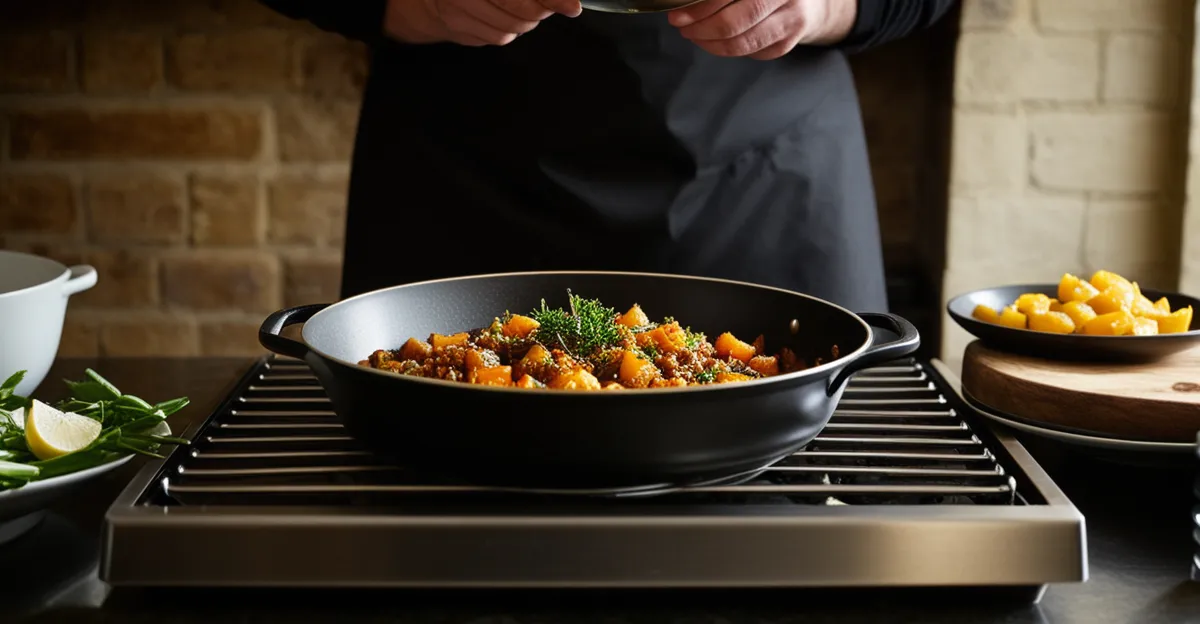Traditional UK Cooking Methods: Core Techniques
Traditional UK cooking centers on classic techniques that have shaped British culinary heritage over centuries. Key methods include roasting, stewing, baking, poaching, and grilling. Each holds distinctive features that reflect historical contexts and regional influences.
Roasting involves dry heat, typically in an oven, producing caramelized exteriors and tender interiors—think Sunday roasts, a British staple. Stewing uses slow cooking in liquid, ideal for tougher cuts of meat, resulting in rich, flavorful dishes such as Lancashire hotpot. Baking, another cornerstone, applies heat through an oven to prepare breads, pies, and puddings, sustaining traditions like the bakewell tart.
Also to read : How can you bake a perfect Victoria sponge cake?
Poaching gently cooks ingredients in simmering liquid, preserving delicate textures, as seen in classic eggs Benedict or fish preparations. Grilling applies direct heat, often over coals or gas, creating pronounced smoky flavors and crispy finishes characteristic of dishes like grilled kippers.
These foundational methods not only define traditional UK cooking but continue to influence contemporary food culture due to their effectiveness in enhancing flavors and textures while preserving British culinary heritage.
Also read : How Can Home Cooks Innovate Traditional UK Dishes?
Advantages of Traditional UK Methods in Contemporary Cooking
Traditional UK cooking offers clear benefits through its time-tested methods. Roasting and stewing, for example, promote deep flavor development and tender textures impossible to replicate quickly. The slow cooking in stewing breaks down tough fibers, enriching dishes with intense, hearty profiles cherished in British culinary heritage.
These methods also contribute significant nutritional advantages. Slow cooking retains essential nutrients and reduces the need for added fats, aligning with modern health-conscious trends. Additionally, resourceful use of ingredients—such as economical cuts of meat in stewing—supports sustainability by minimizing waste.
Beyond flavor and nutrition, traditional techniques maintain the integrity and authenticity of dishes adapting well to contemporary kitchens. Their influence shapes innovations where chefs enhance original recipes without losing cultural roots. These classical techniques remain relevant by facilitating culinary enhancement that balances time-honored methods with modern tastes, underscoring their lasting appeal in evolving food culture.
Practical Integration: Applying UK Techniques to Modern Recipes
Blending traditional UK cooking techniques with contemporary culinary trends enriches both British and global food scenes. Roasting, stewing, and baking remain versatile foundations easily adapted to modern recipes. For instance, roasting root vegetables with exotic spices adds a fresh twist while preserving that classic caramelized texture.
Step-by-step, adapting traditional methods to new dishes involves understanding core principles: roasting applies dry heat for crispness and depth; stewing uses slow, moist heat to tenderize and develop complex flavors; baking offers reliable heat distribution for even cooking. Modern chefs often incorporate these steps into fusion cuisine, combining British methods with influences like Mediterranean herbs or Asian aromatics.
Culinary fusion encourages creativity by merging traditional UK cooking with international ingredients, preserving heritage while inviting innovation. For example, poaching fish in Thai-inspired broth maintains gentle cooking but introduces vibrant flavors. Grilling marinated meats with global spice blends highlights smoky notes and creates new taste profiles.
By integrating classic techniques into diverse recipes, cooks uphold the British culinary heritage while promoting experimentation that reflects evolving palates. This approach makes recipe adaptation practical and inspiring, sustaining tradition through dynamic, flavorful dishes.








